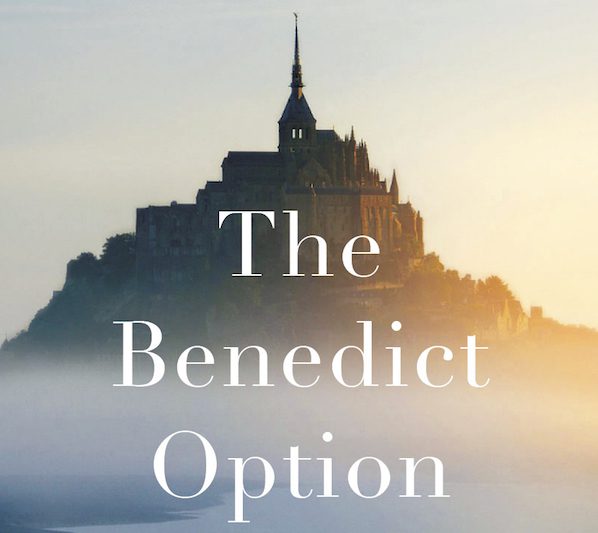Evangelicals And The Benedict Option
 Hi all, I’m in transit back to Baton Rouge after a great week in Louisville at the Southern Baptist Theological Seminary, and Boyce College. Yesterday afternoon I sat down with the great Al Mohler to record an episode of his podcast Thinking In Public. Late in the interview, he said something to the effect of, “Now, I have to ask you a tough question, and I want you to be honest when you answer me.”
Hi all, I’m in transit back to Baton Rouge after a great week in Louisville at the Southern Baptist Theological Seminary, and Boyce College. Yesterday afternoon I sat down with the great Al Mohler to record an episode of his podcast Thinking In Public. Late in the interview, he said something to the effect of, “Now, I have to ask you a tough question, and I want you to be honest when you answer me.”
I seized up. He continued, “Do you think that Evangelicalism has what it takes to do the Benedict Option?”
I gave him my honest answer: “I don’t know.” I explained that I don’t want to make a comment on a form of the Christian faith about which I know so little. I told him that I have to believe it is possible, because I know Evangelicals personally who are doing it (and interviewed some of them for my book), but in general, I don’t see that they have nearly the resources in their tradition that Catholics and Orthodox do. But that could just be my ignorance.
He replied that he is certain that Evangelicalism does not have the internal resources to do the Benedict Option — but that classic Protestantism does. He talked about how Evangelicals need to plunge deeply back into their Reformation roots and recover the spirituality and structure of the Reformers. I’m not going to say more, because you’ll really want to hear what Dr. Mohler had to say on this front. It was quite powerful, and to me, a revelation of sorts. Not sure when the podcast will be up.
I had a conversation later with another young theologian who told me there is a rising number of young Evangelical pastors and theologians — many of them there at SBTS — who understand completely that Evangelicalism, as it is currently constituted, won’t make it. Too shallow, too fleeting. Yet they remain Evangelical in the sense of believing deeply in the mission of proclaiming the Gospel to those who do not know Christ. The difference is that they are committed to doing exactly what Dr. Mohler proposed on the podcast: going deep into the Reformation to recover what Luther, Calvin, and the others had — and that includes doing a deep dive into the Church Fathers (that is, theologians of the patristic period).
I find this exciting, to be honest. To be sure, I would love it if everyone became Orthodox, and I know that there are tremendous Ben Op resources near to hand in Orthodoxy. In all honesty, though, if you cannot do the Ben Op unless you become Orthodox (or Catholic), then a lot of people who need to root themselves firmly in the Christian tradition, against the dissipating currents of modernity, are not going to do it. It is not up to me to tell Catholics or Evangelicals how to do the Ben Op while being faithful to their own traditions, though knowing Catholicism from having been Catholic for 13 years, I have a pretty good idea of what I would say. My goal with The Benedict Option book is to spark wide and serious discussion within the various Christian traditions, and across these traditions. And not just discussion, but creative action.
Still, let me put the question to my Evangelical and classically Protestant readers: what resources do you see within your specific tradition that will help you live out the Benedict Option?
By the way, David Goodwin, head of the Association of Classical Christian Schools, has very generously endorsed The Benedict Option:
The Benedict Option rings a bell that has long rested. The Christian Way has been intermingled with culture many times before. But this time is different. Dreher brings to light a cultural phenomenon in the West which has precedent, if ever, only early in the Christian era. His ‘Benedict’ prescription is an insightful response for Christians in a post-Christian culture.
Retreats normally don’t end well, especially in culture wars. But, rather than retreat, Rod Dreher’s The Benedict Option advocates for Christians take up defensible positions. For too long, we’ve taken half-measures to transform our children, our families, and our communities toward Christ and away from the ideas and false-virtues that are dominant in our post-Christian culture. This kind of ‘running retreat’ will disperse and collapse true Christian communities unless we take bold action. Dreher’s comprehensive proposal may just provide the decisive turning-point needed for committed Christians to sustain our identity and become effective as we influence the world for Christ.
I am pleased to recommend The Benedict Option to Christians who are trying to live before God and man, but find it to be increasingly difficult. The work provides a comprehensive call in areas from education, to vocation, to technology, to living ‘the good life’ in a post-Christian culture.

Subscribe for as little as $5/mo to start commenting on Rod’s blog.